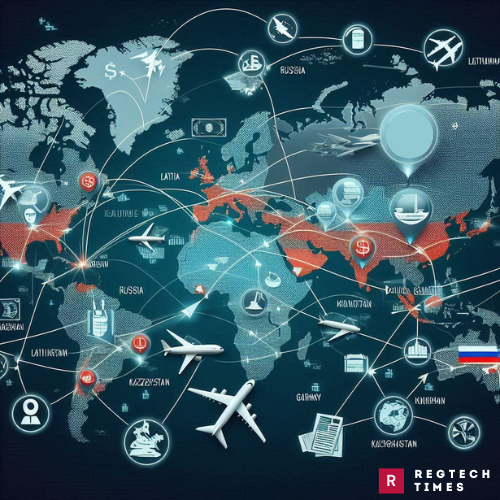Oleg Chistyakov, a Latvian national, has been extradited to the United States to face serious charges in connection with an elaborate scheme to illegally export advanced U.S.-origin aircraft technology to Russia. Chistyakov, also known as Olegs Čitsjakovs, made his initial appearance in federal court in Kansas City, Kansas, where he was charged with conspiracy, violations of the Export Control Reform Act, smuggling, and money laundering. His case is a significant development in the ongoing efforts by U.S. authorities to enforce sanctions and export controls in response to Russia’s aggressive actions in Ukraine.
Oleg Chistyakov and the International Conspiracy
At the center of this case is Oleg Chistyakov, who is accused of playing a pivotal role in a years-long conspiracy to export sensitive avionics equipment to Russia. Chistyakov is the third defendant in this case, following two U.S. citizens, Cyril Gregory Buyanovsky and Douglas Edward Robertson, who have already been charged and have pleaded guilty. These individuals allegedly worked together to facilitate the sale, repair, and shipment of U.S.-origin aircraft technology to Russian entities, including the Russian Federal Security Service (FSB), even after the imposition of additional U.S. sanctions following Russia’s invasion of Ukraine.
According to court documents, Oleg Chistyakov operated primarily from Latvia, using his Emirati company, RosAero FZC, to broker deals between U.S. companies and Russian customers. He collaborated with Buyanovsky and Robertson’s U.S.-based company, KanRus Trading Company Inc. (KanRus), to procure avionics equipment that was then illegally exported to Russia. Chistyakov’s involvement included soliciting quotes, negotiating prices, and facilitating payments, all while deliberately circumventing U.S. export laws.
US Sanctions are Devastating Russian Battlecruisers as Western Technology Access is Restricted
How Oleg Chistyakov Allegedly Evaded U.S. Export Laws
To avoid detection by U.S. authorities, Oleg Chistyakov and his co-conspirators allegedly employed a range of sophisticated tactics. They created false invoices and used third-party countries like Germany and the United Arab Emirates (UAE) to transship the avionics equipment, effectively obscuring the final destination. Additionally, the group utilized bank accounts in countries such as Kazakhstan, Kyrgyzstan, and the UAE to handle transactions, further distancing themselves from the illegal activities.
These methods allowed Chistyakov and his associates to continue their operations for an extended period, despite the increasingly stringent sanctions imposed by the U.S. government on Russia. The complexity and international scope of the scheme emphasize the challenges faced by U.S. authorities in enforcing export controls and preventing critical technology from reaching adversaries.
Lithuania Leads the Charge in Investigating Over 50 Cases of Sanctions Violations
Legal Consequences for Oleg Chistyakov
If convicted, Oleg Chistyakov faces a maximum penalty of 20 years in prison and a fine of up to $1 million. The final sentence will be decided by a federal district court judge, taking into account the U.S. Sentencing Guidelines and other relevant legal factors. Meanwhile, Buyanovsky and Robertson, who have already pleaded guilty, are scheduled to be sentenced in the coming months.
Serbia’s Reluctance to Sanction Russia: A Risky Balancing Act in a Complex Geopolitical Landscape
The prosecution of Oleg Chistyakov is being handled by Assistant U.S. Attorneys Scott Rask and Ryan Huschka for the District of Kansas, alongside Trial Attorney Adam Barry of the National Security Division’s Counterintelligence and Export Control Section. The Justice Department’s Office of International Affairs played a critical role in coordinating with Latvian authorities to secure Chistyakov’s extradition to the United States.
Steadfast Defender 24: Lithuania’s Vigilant Participation to Combat Russian Threats
Broader U.S. Response to Russian Aggression
The case against Oleg Chistyakov is part of a broader initiative by the U.S. government to enforce sanctions and export controls against Russia. This effort is led by the Justice Department’s Task Force KleptoCapture, an interagency law enforcement task force created in response to Russia’s unprovoked military invasion of Ukraine. Formed by the Attorney General in March 2022, the task force is committed to combating attempts to evade or undermine the sanctions and economic measures enforced by the U.S. and its allies.
Taskforce KleptoCapture: What is it ? Why you should know about it ?
As the extradition and prosecution of Oleg Chistyakov move forward, this case serves as a reminder of the ongoing challenges of enforcing international trade laws and preventing sensitive technology from falling into the wrong hands. The U.S. government’s pursuit of justice in this case reflects its commitment to protecting national security and supporting Ukraine in the face of Russian aggression.


